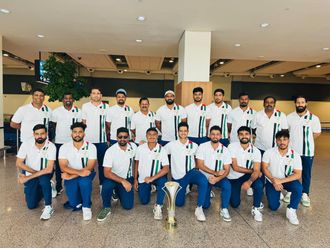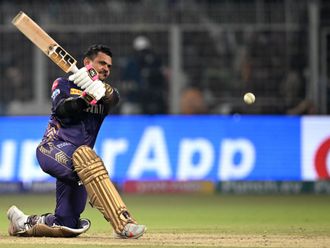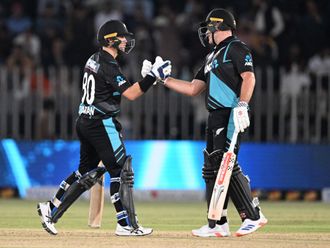Rajkot: England’s tour of India starts on Wednesday in Rajkot, a most fitting stage for the rivalry between two batsmen bidding to become their country’s finest — England’s Joe Root and the Indian captain Virat Kohli.
Neither England nor India have played a Test before in Rajkot, which lies in the centre of the Kathiawar Peninsula, that ear which sticks out from the head of western India. Yet, the region has produced some of the world’s finest cricketers for three countries. The first batsman to score a hundred runs before lunch in a Test went to school in Rajkot, having been born down the road in Jamnagar.
From Rajkumar College, Kumar Shri Ranjitsinhji went to Cambridge University, and was too brilliant — as the inventor of the leg-glance and arguably the sweep — not to be selected for England in the 1896 Ashes. On the third morning of the Old Trafford Test, Ranji hit 113 runs.
India’s finest spin-bowling allrounder, Vinoo Mankad, was also born in Jamnagar — although he will not be the finest for much longer if Ravi Ashwin has another stellar series, his fifth in a row.
Pakistan’s first great batsman, Hanif Mohammad, who died earlier this year, came from another part of this Peninsula, Junagadh, along with his three brothers, who also played Test cricket, before they had to flee westwards at Partition.
This region has long been friendly to batsmen and England will be wondering if this trend continues. England have played high-scoring one-day internationals at the former ground in Rajkot, which has had various names, the last of them in 2008, and at the new ground, the Saurashtra Cricket Association ground, in 2013.
Alastair Cook, England’s one-day captain at the time, is the only member of the current England party to have batted there. Joe Root played in the 2013 ODI as a bowler, as did Steve Finn in the days when he had exceptional pace. Finn was selected for the second Test in Dhaka, a rather expensive mistake: 11 fruitless overs for 48 runs in a low-scoring match.
Stuart Broad will return for his 100th Test, which James Anderson is due to watch as he rehabilitates from his shoulder injury. It will be a happy series for England if, in spite of being outspun, they win a couple of Tests, or even one.
It will be an unhappy series, which could end in the resignation of Cook, if their top order keeps failing in their first innings. Only when Root scored his 254 at Old Trafford against Pakistan, have England reached 330 in their first innings since hosting Sri Lanka: hence three defeats in their last six Tests, including the historic one by Bangladesh. That double-century was the only occasion Root has reached 80 since his promotion to No 3.
Cook has made a single century in the last year. The batting around them has become ever flimsier: Alex Hales, Nick Compton, James Vince and now Gary Ballance have all been tried and dropped. Nineteen-year-old Haseeb Hameed, who could have been given a debut in Bangladesh, will be Cook’s latest partner.
Kohli has his concerns, too, about his side’s batting after the loss of Rohit Sharma: he is left with only five proven batsmen. But Ashwin batted cannily at No 6 on India’s recent tour of the West Indies, so India could play three spinners and two seamers.
Under a new board president, Test cricket has been made India’s priority, to the extent that they are playing 13 Tests this home season. Six new venues are being inaugurated: England will be playing the second Test at another of them, Visakhapatnam, as the series begins with a strenuous schedule: three days between the first and second, then four between the second and third, with a long domestic flight each time.
This is the first time England have undertaken a tour consisting solely of five Tests: needless to say it was devised by former England and Wales Cricket Board administrators who had never played a first class match between them, and it has left England with an even harder task than touring India would otherwise be.
This schedule is sustainable for batsmen making runs and spinners, but not pace bowlers, wicketkeepers and batsmen out of nick. Hence home advantage is even more advantageous: India can bring in players who have just performed in their domestic competition, named after Rajkot’s most famous son, the Ranji Trophy.












